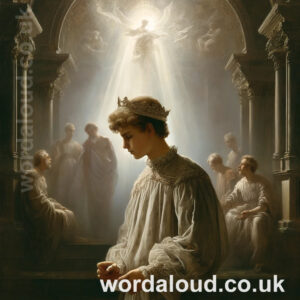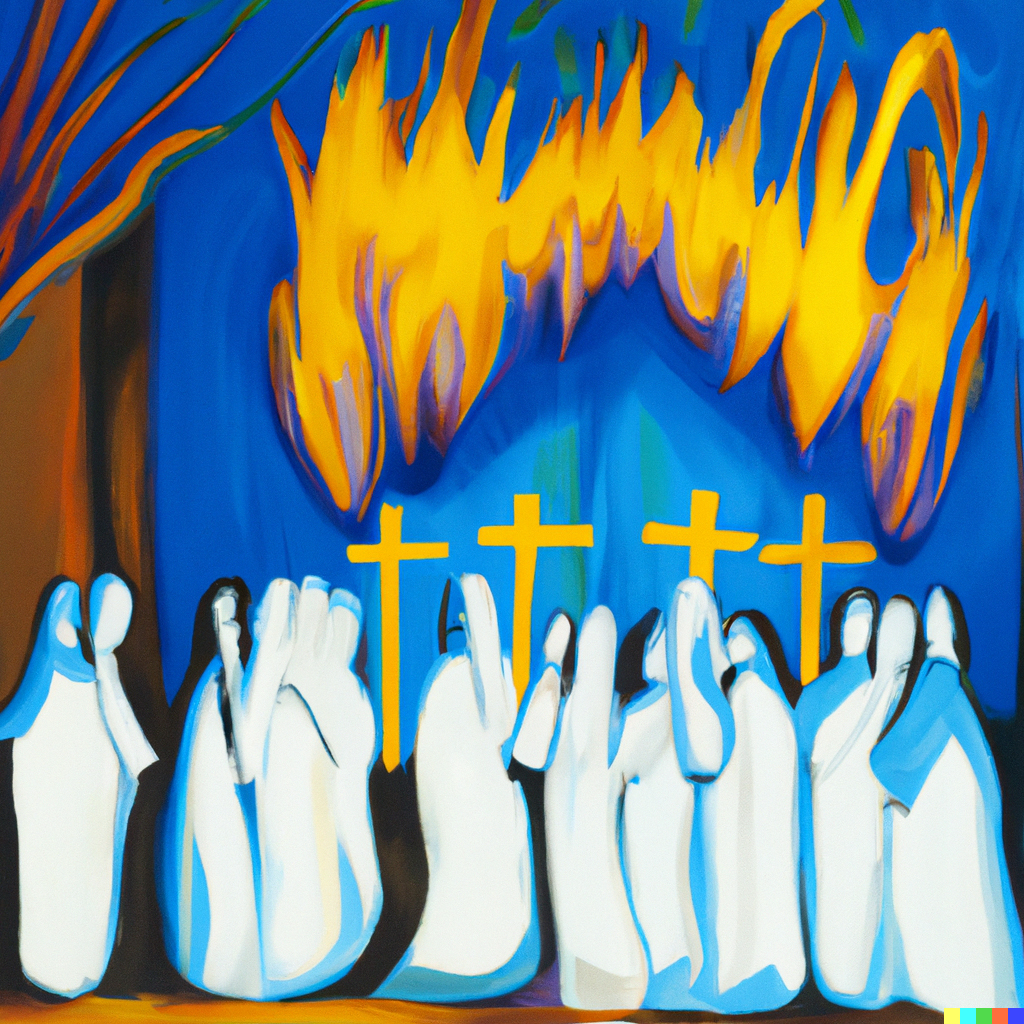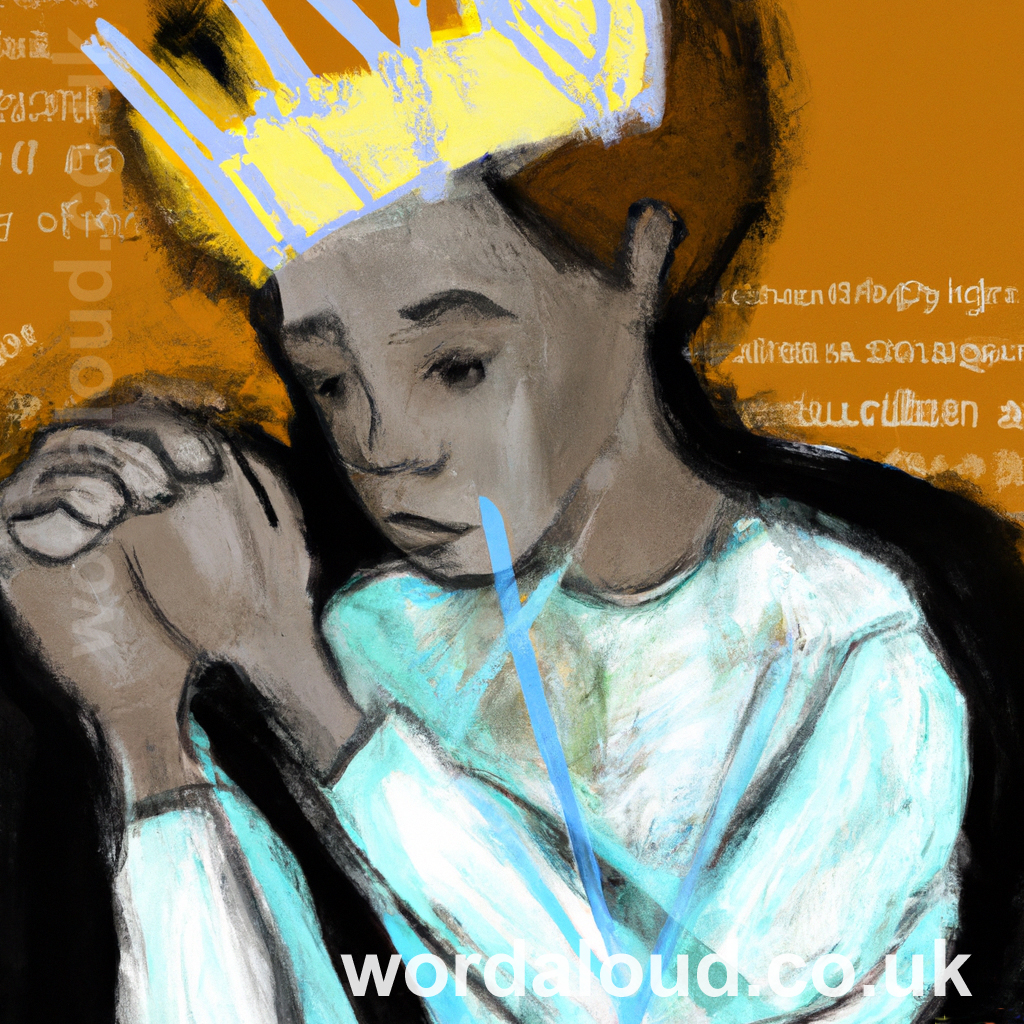Christian Art | The Eye Is The Lamp Of The Body
Matthew 6: 19-23 – Week 11 Ordinary Time, Friday (Audio Bible KJV, Spoken Word)
19 ¶ Lay not up for yourselves treasures upon earth, where moth and rust doth corrupt, and where thieves break through and steal:
20 But lay up for yourselves treasures in heaven, where neither moth nor rust doth corrupt, and where thieves do not break through nor steal:
21 For where your treasure is, there will your heart be also.
22 The light of the body is the eye: if therefore thine eye be single, thy whole body shall be full of light.
23 But if thine eye be evil, thy whole body shall be full of darkness. If therefore the light that is in thee be darkness, how great is that darkness!
No-one lies on his death bed wishing he’d bought more product – more disposable or semi-disposable consumer trash. It may be that when we are confronted with the thought of owning nothing, we may feel straight away that there are things we treasure, which we hope to hand on to other people. There are beautiful things, indeed of such beauty that we know we don’t finally possess those things – we could not hoard them; they will be passed on to other people, and who knows how many hundreds or thousands of years they might give people pleasure.
Perhaps in the things that are of good quality, which we temporarily own, we feel something, very, very remotely, of the greater treasures, precisely because these are not treasures hoarded; rather, there is an openness about them, a quality of sharing. Holding them, we may imagine someone else in the future holding them also. There is a selflessness about this. We’ll pass this on.
Perhaps also it is in the tat that we seem, as if inevitably, to acquire, and which ends up on the scrapheap, that we see at its starkest the futility of giving our attachment to material things, which Jesus teaches us in this reading. Already, by the time we are adults, there is so much that moth and rust have consumed. Already, in our technological age, we may have before we can even grow a beard a stack of inbuilt obsolescence piled up beneath fresh dust in the corner of the room, which wowed us so very much, and was so expensive, as we loved that product just a year ago.
There are practical issues to owning property, which can obscure our relationship with God. We may worry about it. Property can be bulky and difficult to move. It breaks, needs maintaining. We may feel that it ties us into the grid – the insurance, the taxes on where we live and it lives, the utility bills applying to the building we’re housed in. Some call it the rat race. Others lament ‘the system’. (Can’t pray now: I’m busy.) It seems there are issues of ownership, which may not sit at ease with the attitude of spiritual poverty to which Jesus calls us in the Sermon on the Mount. Moth and rust literally corrupt, and then some more. Certainly, when we are with Jesus in prayer, then we own nothing – nothing of relevance. When we pray, we don’t even own ourselves.
The eye is the lamp of the body. Let our bodies be full of light. Our faith in God informs our sense of all the things that we have in our lives. When we are striving to store treasure in heaven, then our whole lives become indeed full of light. Transitory pleasures are appropriately valued. The great message of joy spreads between us all.
Jesus particularly wants us to know that property should never be a barrier between people. One person’s light is not diminished by another person’s light. We shine together. We are called to share.
32 And the multitude of them that believed were of one heart and of one soul: neither said any of them that ought of the things which he possessed was his own; but they had all things common.
33 And with great power gave the apostles witness of the resurrection of the Lord Jesus: and great grace was upon them all.
34 Neither was there any among them that lacked: for as many as were possessors of lands or houses sold them, and brought the prices of the things that were sold,
35 And laid them down at the apostles’ feet: and distribution was made unto every man according as he had need.
36 And Joses, who by the apostles was surnamed Barnabas, (which is, being interpreted, The son of consolation,) a Levite, and of the country of Cyprus,
37 Having land, sold it, and brought the money, and laid it at the apostles’ feet. (Acts 4: 32-37)
Concluding Prayer
Holy Father and Lord,
you willed that Christ your Son,
should be the price of our salvation.
Give us grace so to live,
that through sharing his sufferings
we may be strengthened by the power of his resurrection,
who lives and reigns with you and the Holy Spirit,
God, for ever and ever.

![]()
Audio Bible KJV | Endnotes
The Light Of The Body Is The Eye
Jesus speaks of the importance of prioritizing spiritual wealth over material wealth. Jesus warns against storing up treasures on earth, where moth and rust corrupt and where thieves break in and steal. Instead, Jesus urges his listeners to store up treasures in heaven, where they will be safe from destruction and where they will last forever.
The passage then goes on to say: ‘The light of the body is the eye: if therefore thine eye be single, thy whole body shall be full of light. But if thine eye be evil, thy whole body shall be full of darkness. If therefore the light that is in thee be darkness, how great is that darkness!’
What does Jesus mean by ‘the light of the body is the eye’? This phrase has been interpreted over the centuries. Some have suggested that it refers to the idea that the eye is the window to the soul, and that the light within us comes from our innermost being. Others have suggested that it refers to the idea that our vision is what allows us to perceive the world around us, and that it is through our eyes that we gain knowledge and understanding.
One interpretation that has been particularly influential is that of Saint Augustine of Hippo, a Christian theologian who lived in the fourth and fifth centuries AD. Saint Augustine argued that the ‘light’ that Jesus is referring to is not a physical light, but rather a spiritual one. According to Augustine, the eye is the organ of the soul, and the light within us is the knowledge and wisdom that we gain through our spiritual faculties.
Saint Augustine also suggested that the ‘single eye’ that Jesus refers to represents a pure and undivided heart, focused solely on God. Saint Augustine contrasted this with the ‘evil eye’, which he associated with greed, lust, and other worldly desires. Augustine believed that if our hearts are divided between God and the world, we will be unable to receive the fullness of God’s light.
Other religious authorities have offered different interpretations of this passage. John Calvin, Protestant theologian of the sixteenth century, suggested that the ‘single eye’ represents faith in God, while the ‘evil eye’ represents unbelief. He argued that those who trust in God will receive his blessings and be filled with his light, while those who reject him will remain in darkness.
Martin Luther, in many ways the founder of the Protestant divergence, interpreted this passage as a warning against the dangers of idolatry. Martin Luther believed that when we focus our attention on material possessions or worldly pleasures, we are in danger of making them into idols and placing them above God. He saw the ‘single eye’ as representing a pure and undivided heart, focused solely on God, while the ‘evil eye’ represents a divided heart, distracted by the temptations of the world.








